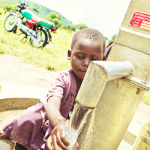 For 14 years, I’ve dealt with situations where people are utterly hopeless due to the desperation of their circumstances. People who need someone to come to their side and lend a helping hand.
For 14 years, I’ve dealt with situations where people are utterly hopeless due to the desperation of their circumstances. People who need someone to come to their side and lend a helping hand.
Today, HopeChest is serving over 11,500 orphans and vulnerable children every day. Our work spans 9 countries, and impacts hundreds of communities. If you were to count the “ripple effect” of our help, that number would be much higher.
But I’ve always wondered how much good HopeChest is doing on a larger, long-term scale. How much are we alleviating poverty? Are we influencing systems to change for the better? Or are we creating dependency.
It’s hard to dispute the short-term impacts when you see kids eating who were previously hungry. Classrooms full of students instead of empty. Death rates from preventable diseases dropping as clean water flows from so many new wells.
But what about the long term change that creates jobs and fuels economies?
Too many times our projects look the same ten years down the road as when they started. Perhaps we aren’t doing as much good as we think…
Looking at the results of 5 decades and $2.3 trillion in Western aid, the poor are still poor. We have missed this core issue. When people are starving, food aid is good. When people are dying of thirst and dirty water, clean water wells are good.
But they are not good enough to release poverty’s relentless grip on millions.
The question I am asking is this: Is there a better way for Christian churches, ministries, and individuals to represent the Gospel by going beyond short term aid and mission trips?
What strides could we make toward long-term solutions to poverty if we changed our mindset toward those trapped by poverty? What if, instead of looking at the poor as beneficiaries, we looked at them as potential–as partners?
I believe the answer is bound up in these ideas:
The poor do not wish to remain poor, but they lack real choices and opportunities.
Instead of fostering those opportunities, we’ve provided aid that has created dependency on our food and water projects.
Long-term solutions will release the creativity and innovation of the poor in ways that create local, free, and thriving markets.
Those markets will be the lever that pulls communities and countries out of poverty.
I am suggesting that we become the fulcrum, the pivot point, upon which the poor can set their lever and move themselves out of poverty.
More to come. Your thoughts and comments welcome as we explore this issue together.

